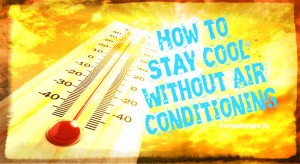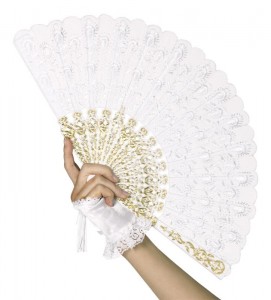It’s heatwave time again!
All across the country, the mercury is climbing…and staying there, way up at the top of the thermometer. But running an air conditioner at full blast to combat the heat can be very expensive, and for those of us on a budget, the resulting bill can be crippling.
So what is a family with no air conditioning to do?
Avoid heating up your house.
Many of the things that we do without thinking are unconsciously adding 5-10 degrees of heat to an already uncomfortably warm house. In the hottest part of the year, I avoid running certain appliances. Some folks say to run those heat-creating appliances at night, but I depend on the cool night time temperatures to bring my home down to a comfortable level the next day.
In the summer, avoid or limit your use of the following:
- Dryer: Make use of the hot sun and hang your laundry outside. Not only will you have fresh, clean smelling laundry that no dryer sheet can top, it’s free and it won’t warm up your house!
- Washer: Washing machines can also generate a great deal of heat and humidity, particularly if you wash your clothing in hot water. If at all possible, wash your laundry in cold water during the hottest parts of the year.
- Oven: Rely on outdoor cooking methods or crockpots (Click HERE to learn more about hot-weather cooking methods)
- Dishwasher: Think about how hot the dishes are if you reach in the second the dishwasher is finished running to grab a plate. Now, consider how much heat that adds to your house! It is much more efficient to wash your dishes by hand in the summer. A sink full of soapy water and one full of rinse water will add far fewer degrees to the temperature of your house.
- Lighting: Some bulbs, particularly halogen bulbs, generate a great deal of heat. If a lightbulb is hot to the touch, it’s adding to the temperature of your house. Look into LED lights or compact fluorescents to keep your home cooler.
Cool it down naturally.
Air conditioning is a fairly recent invention. It is only in the past few decades that most people decided that air conditioning was a “necessity.” Unfortunately now, most houses are built without consideration for natural cooling. If a new home is being built, chances are, it will have central air conditioning. While this is a nice perk, it’s important to note that in the midst of a power outage, these houses with stunning floor to ceiling windows are going to be hotter than blue blazes. Older homes have a lot of advantages over their newer counterparts when it comes to cooling them without air conditioning.
I live in a sweet little 100+ year old Victorian house that is perfectly comfortable in all but the very hottest of weather. The windows are placed across from one another throughout the house, for optimum cooling and cross-breezes.
Here’s the technique that keeps our home pleasant when the mercury climbs into the 90s:
- As soon as it starts to cool down in the evening, I open all of the windows and blinds. There’s a ceiling fan in every room and those run all the time.
- We also have some window fans which we turn on in the evening. These pulls in the lovely cool night air.
- In the morning, the house is so cool that sometimes you need a hoodie during that first cup of coffee!
- I then go around and close all of the windows and blinds. This keeps out the heat and keeps the house from passively warming up from the sun. (In the winter, I do the opposite of this in order to heat the house using the sun.) The ceiling fans continue to run all day and we have small oscillating fans to use in the rooms we are in.
- Rarely does the temperature in my house ever rise about 85 degrees. That’s pretty warm but certainly not intolerable.
Evaporative cooling for humans
Here’s the thing – we have basically evolved ourselves right out of being able to cool down without the aid of an air conditioner. We go from an air conditioned home to an air conditioned car and have lunch at an air conditioned restaurant. Then we drive our air conditioned car back home, suffer through perhaps 20-30 minutes of necessary outdoor work, and then go in, gasping for air, to cool off in front of another air conditioner.
Our bodies no longer know how to cool themselves because they never have to do so. We suffer far more in the heat than previous generations ever did. That’s why this year, my family is eschewing the air conditioner. What is going to happen in a long-term grid-down scenario? I’ll tell you what – people will drop like flies of heat-related illnesses. But you can train your body to tolerate heat again.
A good friend of mine lives in the desert and has no air conditioning. It regularly gets to 110 degrees in his home and he is barely affected. That’s because his body’s cooling system is efficient – he uses it on a regular basis
I’m not suggesting that you go run a marathon in the midst of a heatwave, but perhaps people need to stop being so uncomfortable with sweat. Sweat is the human body’s evaporative cooling system. Here’s the rundown on how the human body cools itself from an article called “The Physics of Sweating“:
When we sweat, our skin and clothing become covered with water. If the atmospheric humidity is low, this water evaporates easily. The heat energy needed to evaporate the water comes from our bodies. So this evaporation cools our bodies, which have too much heat. For the same reason splashing water on ourselves when it is hot feels good. Being wet during cold weather, however can excessively chill us because of this same evaporation effect.
Sweating is therefore the human body’s primary cooling mechanism. Because this mechanism uses water, we need to replace lost fluids by drinking more fluids in hot weather. This is especially true after exercising or working in hot weather.
When it is very humid, our sweat does not evaporate as easily. With the body’s primary cooling process not working efficiently, we feel hotter. That is why a hot humid day is more uncomfortable than a hot dry day.
As the air near our bodies absorbs evaporating sweat, the humidity very close to our skin increases, so our sweat does not evaporate as easily. If there is a breeze or wind, the air near our bodies is replaced by dryer air that can continue to absorb evaporating sweat. Hence a breeze on a hot day has a pleasant cooling effect. On a cold day it produces a wind chill effect making it seem much colder than it actually is.
Despite the fact that sweating can make us feel unpleasantly sticky, the principles of thermal physics make sweating a very important mechanism for cooling the body in hot weather. (source)
By allowing yourself to get hot and letting your body cool itself, you can build up a tolerance to the heat. By avoiding heat and sticking to chilly air-conditioned rooms, you will be far more uncomfortable in a situation in which air conditioning is not available.
When the grid fails…
The situation that comes to mind is the Derecho storms that struck metro DC a few years back. The power was out for a week in the midst of a terrible heatwave and people died from heat-related ailments. Many others were sick, suffering from heat exhaustion and heat strokes, and others were miserably uncomfortable. As mentioned above, homes really aren’t built to be cooled without air conditioning any more, and humans aren’t used to letting their bodies cool themselves.
Here are some strategies to help you cool off when you can’t run fans or air conditioners:
- Channel your inner Southern belle. Slowly fan yourself with a handheld fan. Mint juleps are optional.
- Keep hydrated. Your body needs the extra water to help produce sweat, which cools you off.
- Change your schedule. There’s a reason that people who live near the equator close down their businesses and enjoy a midday siesta. Take a tepid shower and then, without drying off, lay down and try to take a nap. At the least do a quiet activity.
- Play in the water. Either place a kiddie pool in a shaded part of the yard or use the bathtub indoors. Find a nearby creek or pond for wading or swimming. (Note: Playing in the water isn’t just for kids!)
- Soak your feet. A foot bath full of tepid water can help cool you down.
- Avoid heavy meals. Your body has to work hard to digest heavy, rich meals, and this raises your temperature. Be gentle on your system with light, cool meals like salads, cold soups, and fruit.
Lizzie Bennett of Underground Medic adds some great ideas for keeping cool when the grid is down. Click HERE to check them out.
How do you keep your cool?
Do you have air conditioning at your home? Do you run it all the time? What are some techniques that you use to keep cool in hot weather?


